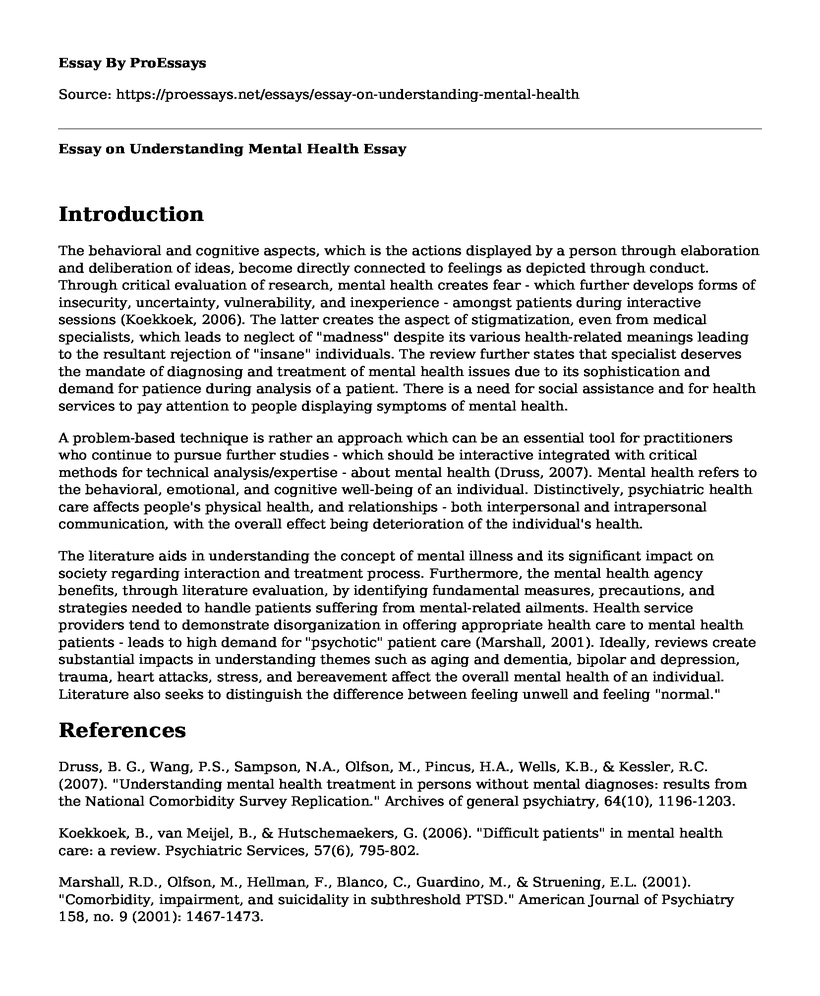Introduction
The behavioral and cognitive aspects, which is the actions displayed by a person through elaboration and deliberation of ideas, become directly connected to feelings as depicted through conduct. Through critical evaluation of research, mental health creates fear - which further develops forms of insecurity, uncertainty, vulnerability, and inexperience - amongst patients during interactive sessions (Koekkoek, 2006). The latter creates the aspect of stigmatization, even from medical specialists, which leads to neglect of "madness" despite its various health-related meanings leading to the resultant rejection of "insane" individuals. The review further states that specialist deserves the mandate of diagnosing and treatment of mental health issues due to its sophistication and demand for patience during analysis of a patient. There is a need for social assistance and for health services to pay attention to people displaying symptoms of mental health.
A problem-based technique is rather an approach which can be an essential tool for practitioners who continue to pursue further studies - which should be interactive integrated with critical methods for technical analysis/expertise - about mental health (Druss, 2007). Mental health refers to the behavioral, emotional, and cognitive well-being of an individual. Distinctively, psychiatric health care affects people's physical health, and relationships - both interpersonal and intrapersonal communication, with the overall effect being deterioration of the individual's health.
The literature aids in understanding the concept of mental illness and its significant impact on society regarding interaction and treatment process. Furthermore, the mental health agency benefits, through literature evaluation, by identifying fundamental measures, precautions, and strategies needed to handle patients suffering from mental-related ailments. Health service providers tend to demonstrate disorganization in offering appropriate health care to mental health patients - leads to high demand for "psychotic" patient care (Marshall, 2001). Ideally, reviews create substantial impacts in understanding themes such as aging and dementia, bipolar and depression, trauma, heart attacks, stress, and bereavement affect the overall mental health of an individual. Literature also seeks to distinguish the difference between feeling unwell and feeling "normal."
References
Druss, B. G., Wang, P.S., Sampson, N.A., Olfson, M., Pincus, H.A., Wells, K.B., & Kessler, R.C. (2007). "Understanding mental health treatment in persons without mental diagnoses: results from the National Comorbidity Survey Replication." Archives of general psychiatry, 64(10), 1196-1203.
Koekkoek, B., van Meijel, B., & Hutschemaekers, G. (2006). "Difficult patients" in mental health care: a review. Psychiatric Services, 57(6), 795-802.
Marshall, R.D., Olfson, M., Hellman, F., Blanco, C., Guardino, M., & Struening, E.L. (2001). "Comorbidity, impairment, and suicidality in subthreshold PTSD." American Journal of Psychiatry 158, no. 9 (2001): 1467-1473.
Cite this page
Essay on Understanding Mental Health. (2022, May 03). Retrieved from https://proessays.net/essays/essay-on-understanding-mental-health
If you are the original author of this essay and no longer wish to have it published on the ProEssays website, please click below to request its removal:
- Paper Example on Stress
- Global Money Can Not Buy Happiness - Essay Sample
- Essay Sample on Online Therapy
- Research Paper on Mental Disorders and Illnesses
- Paper Example on Drug Courts: Examining Their Benefits in Today's Society
- Essay Example on Sharpen the Saw: Self-Renewal to Enhance Your Life
- Essay Sample on Maximizing Well-Being: Understanding Mindfulness & Its Link to Positive Psychology







